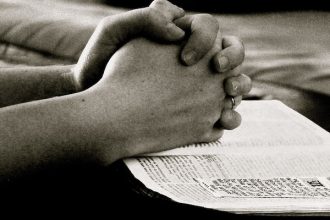As he was passing by, he saw a man blind from birth. His disciples asked him: “Rabbi, who sinned, this man or his parents, that he was born blind?”
“Neither this man nor his parents sinned,” Jesus answered. “This came about so that God’s works might be displayed in him. We must do the works of him who sent me while it is day. Night is coming when no one can work. As long as I am in the world, I am the light of the world,” (John 9:1-5).
The disciples asked a straightforward question, albeit one that was founded on an assumption. They assumed that the man’s blindness was due to sin – some kind of punishment brought upon him either because of his own transgressions or that of his parents. Jesus, though, let them know right quick that their question was flawed. The blindness wasn’t due to some latent sin in the man’s life or that of his parents, but instead there was another purpose for it. It was a purpose that the disciples could not see – a purpose, you might say, they themselves were blind to.
For our part, there are a lot of things we can learn here. We can learn, for example, that God takes the most unlikely of things and uses them for His own glory. That even something as terrible as the suffering of someone disabled from birth can end in the glory of God. Surely we have seen that happen to some extent, even in the midst of the current pandemic. In the midst of suffering, in the midst of isolation, in the midst of destruction, there is yet hope. There is prayer. There is a longing for togetherness. There is care for the neighbor and the reconnection of family. These are all good things brought from bad.
We can also learn that when we look around us and see suffering in the world that it is wrong to jump to the conclusion that the suffering in the life of someone is punishment for their sin. There’s not a straight line drawn between those things, and if we can’t see it clearly enough in this passage, we only have to look to the entire account of Job to find more evidence. In that story, Job’s three friends play the role of the disciples, assuming that Job must have sinned, and that his suffering was a result. Surely we can also see that now – that it would be wrong for us to look at what has fallen upon the world and assume that there is a straight line between some specific sin and this pandemic.
Even so, there is a more subtle way in which we might make the same kind of mistake. Let’s zoom out just a little bit, and it will become clear.
The disciples were seeking to explain the suffering they saw, and they thought they had it nailed. They had found the “why” behind the man’s blindness, and in this particular case, they thought the “why” was sin. But consider this – let’s say that we walk through this period of sickness and isolation together, and as we do, we collectively look to the sky and ask that same question: “Why is this happening to us?”
Then, at some point in the future, we are able to look and see the good that God brought out of this pandemic. Maybe families are still closer together. Maybe we have a new appreciation of what it means to gather as the body of Christ. Maybe we are a bit more kind and understanding toward each other. We are able to look and see the real life example of Romans 8:28 – that God indeed does work all things for the good of those who love Him and are called according to His purpose.
So we look and see this good God has wrought, and in an effort to give testimony about what He has done, we say something like, “At the time I didn’t understand why we all went through this, but now I see clearly what God was doing.” It’s a noble attempt, and it certainly has the right spirit behind it, but maybe – just maybe – we are yet again making the same mistake as Job’s friends and the disciples:
We are presuming to know the reason behind suffering. And here we should tread very lightly.
Sure, we might be able to see some of the good God has brought from hardship. And sure, we might be able to see His redemptive hand at work in the midst of our trial. But isn’t it presumptuous – even arrogant – to ultimately say, in a definitive way, that we know the reason “why” God allowed what He did?
Who has known the mind of God? And who’s to say that God’s eternal reasons don’t stretch beyond our specific situation to others? Not one of us is able to do that.
Be careful, then, in trying to explain what’s happening right now. Be careful, lest we put ourselves in the place of God Himself. Rather than trying to explain our suffering, let us give thanks that God brings good out of bad; that God redeems the pain of His people; and that God is wiser than we are. Let’s not explain our suffering; let’s endeavor to trust God before, during and after it.
Subscribe to MichaelKelley.co
Never miss a new post. Subscribe to receive these posts in your inbox and to receive information about new discipleship resources.






3 Comments